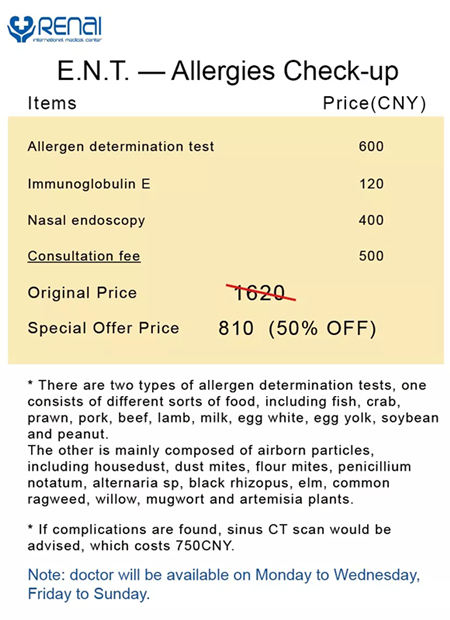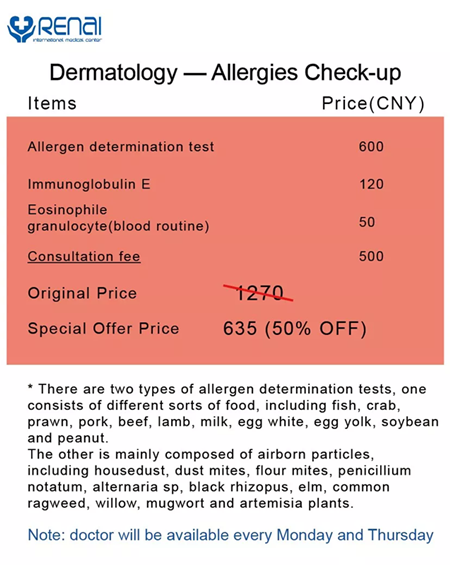Allergies Check-up Special Offer | Learn Allergies In 2 mins
Allergies, also known as allergic diseases, are a number of conditions caused by hypersensitivity of the immune system to something in the environment that usually causes little or no problem in most people.
These diseases include allergic rhinitis (hay fever), food allergies, atopic dermatitis, allergic asthma and etc.
Symptoms may include red eyes, an itchy rash, sneezing, a runny nose, shortness of breath, or swelling.
Depending on the rate of severity, allergies can include skin reactions, bronchoconstriction, swelling, low blood pressure,coma, and death. This type of reaction can be triggered suddenly, or the onset can be delayed. The nature of anaphylaxis is such that the reaction can seem to be subsiding, but may recur throughout a period of time.
Common allergens include pollen and certain food. Metals and other substances may also cause problems. Food, insect stings, and medications are common causes of severe reactions.
Many allergens such as dust or pollen are airborne particles. In these cases, symptoms arise in areas in contact with air, such as eyes, nose, and lungs. For instance, allergic rhinitis causes irritation of the nose, sneezing, itching, and redness of the eyes. Inhaled allergens can also lead to increased production of mucus in the lungs, shortness of breath, coughing, and wheezing.
Aside from these ambient allergens, allergic reactions can result from foods, insect stings, and reactions to medications like aspirin and antibiotics such as penicillin. Symptoms of food allergy include abdomial pain, bloating, vomiting, diarrhea, itchy skin and rash.
Insect stings, food, antibiotics, and certain medicines may produce a systemic allergic response that is also called anaphylaxis; multiple organ systems can be affected, including the digestive system, the respiratory system, and the circulatory system.
Their development is due to both genetic and environmental factors. The underlying involves immunoglobulin E antibodies (IgE), part of the body's immune system, binding to an allergen and then to a receptor on mast cells or basophils where it triggers the release of inflammatory chemicals such as histamine.
Diagnosis is typically based on a person's medical history. Further testing of the skin or blood may be useful in certain cases.
Treatments for allergies include avoiding known allergens and the use of medications such as steroids and antihistamines. In severe reactions, injectable adrenaline is recommended. Allergen immunotherapy, which gradually exposes people to larger and larger amounts of allergen, is useful for some types of allergies such as allergic rhinitis and reactions to insect bites.


Book an appointment:
Email: info@renai.cn
Phone: 021-5489 3781
- Doctors' Working Schedule from Feb 17 to Feb 28Feb 17, 2025
- Doctors' Working Schedule from October 12 to October 31Oct 12, 2024
- Doctors' Working Schedule from 20th September to 30th SeptemberSep 20, 2024
- Doctors' Working Schedule from 6th September to 18th SeptemberSep 6, 2024
- Doctors' Working Schedule from 15th August to 31st AugustAug 14, 2024

 (8621)54893781,64688888-801/810
(8621)54893781,64688888-801/810  info@renai.cn
info@renai.cn Chinese
Chinese









 沪公网安备 31010402006742号
沪公网安备 31010402006742号